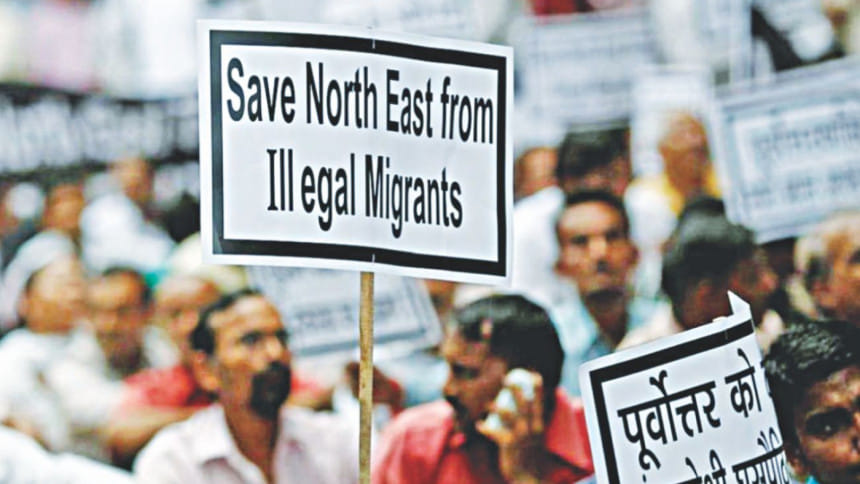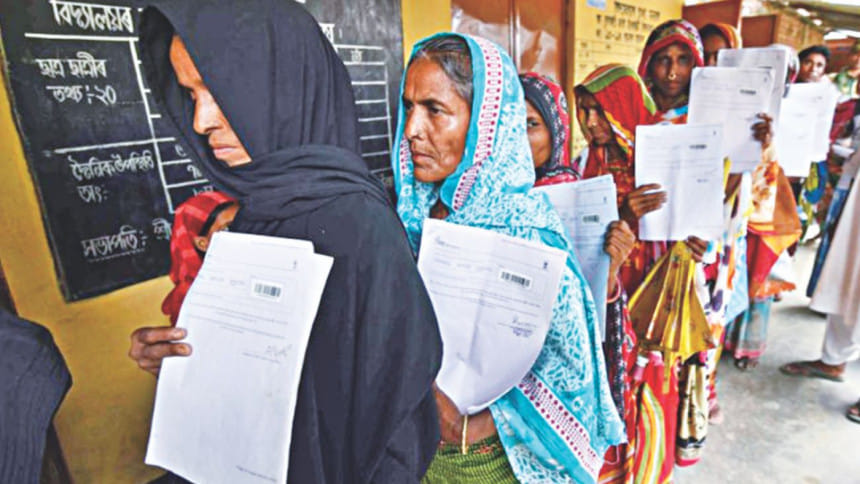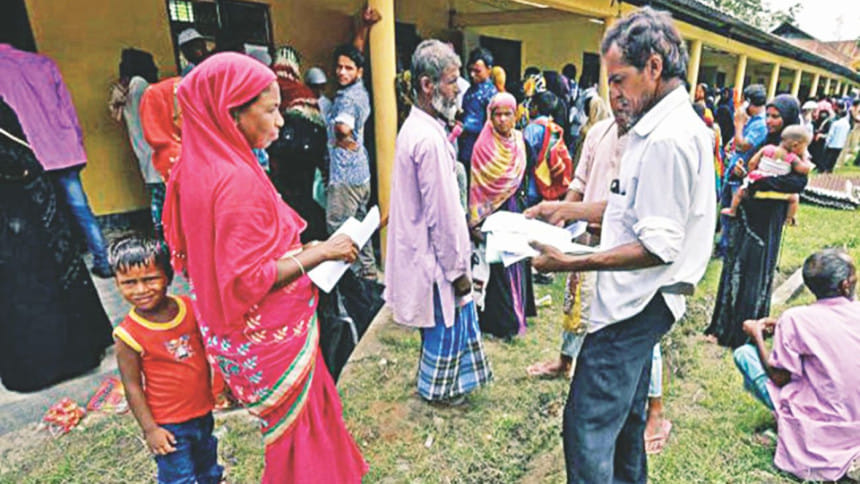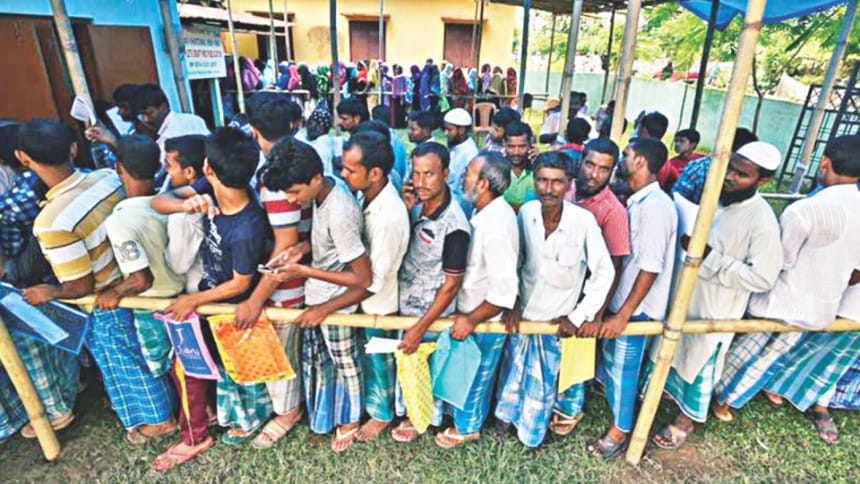Millions will be made stateless, and we're silent

The day after this article is published, three million Bengalis will have become stateless in India.
On July 30, the northeast Indian state of Assam updated its National Register of Citizens (NRC). Persons who could not prove that they or their families were present in Assam on March 24, 1971 or prior were deregistered as citizens. An estimated 4,007,707 people, identified as 'infiltrators', are supposedly to be deported to Bangladesh.
The deadline for challenging the decision is December 15. As of writing this, just about seven lakhs of the 40 lakhs people affected have filed a case, scrambling to find paperwork that proves the existence of some long-lost relative in Assam before 25/3/1971. One can imagine their situation—how many of us keep track of our family documents? How many of us consider the possibility of proving our right to remain in the country we've called home all our lives?
And for at least some—maybe even the majority—the reason they haven't filed an appeal is that they can't. Because they or their family weren't in Assam before Bangladesh's independence. Because they really are migrants, possibly even irregular ones—not difficult at all, as anyone who's been to that border can attest, despite the Border Security Force using us for target practice.
Assuming all their appeals go through and that there is an upsurge of last-minute challengers, it seems greatly generous to say that a million people will have their citizenship restored. A million, I may remind, is roughly the number of Rohingya refugees in Bangladesh. Thrice that number are likely to be in the same situation in Assam by the time you get around to actually reading this.

The Rohingya are an ominous comparison. The parallels are equally foreboding.
The Rohingya population are accused of being Bengali migrants and not true Myanmarese. The long history of cross-pollination across the modern border should, by rights, make definite ethnic lines hard to draw.
However, the Rohingya population was supposedly boosted by the influx of Muslim Bengalis to modern Myanmar during the British administration, to work the land and provide a strong tax base. Cue 1982, the Myanmar government strips these 'outsiders' of their citizenship, and begins to expel them in small waves—until 2017.
Now, to Assam. Similarly, where does one actually draw the line between Assamese, Sylheti and plains Bengali? That region has a long history of ethnic tensions, between the Assamese and indigenous tribes, and populations such as the Gorkhas (also left out of the NRC). Colonial era influxes of Bengalis exacerbated these tensions. While Bengalis as a whole faced opposition in Assam, unlike in Myanmar there is a distinction drawn between Bengali and Bangladeshi. Much of this is predicated on the divergent resentment against the two classes of Bengalis the British imported—the Hindu clerks and colonial administrators, and the Muslim farmers whose rents would make the valleys profitable.
Partition, and the eventual independence of Bangladesh, has made these identity differences even more important.
In postcolonial states, there is a long history of oppression faced by communities identified with the colonial administration—especially so when the community is considered non-native, or was brought over by the imperialists to begin with. Whether explicitly tarred with the brush of the collaborator—such as the Tutsis of Rwanda, or our own Biharis—or seen as a sort of non-native parasite class—South Asians in Uganda, Chinese in Malaysia—the fate of such minorities is often exclusion and marginalisation. Whatever identifiers of difference between them and the 'host' society exist become greatly important.
In this case, it cannot be a surprise to anyone that the principal champion of the denationalisation of the Muslim so-called 'Bangladeshi infiltrators' in Assam is Amit Shah, president of the BJP. Shah has recently declared the NRC is needed, as Assam is not a Dharamshala for migrants.

I am unsure what exactly all these politicians who hate migrants think they actually do. There aren't a lot of social support systems for irregular migrants; in Assam there aren't a lot of social support systems, full stop. There is nothing for them to leech off of, even if they were capable of leeching in the first place—education, health care, all of that tends to be a lot better at policing the identities of the people they serve than we imagine. Migrants work, when paperwork requirements don't stop them working. The charity argument is the home of the bigot and the idiot. There is no charity available.
There certainly isn't charity for people who've been born inside the country and have lived their whole adult lives in it. This last bit is critically important. India had jus soli citizenship (you're a citizen if you're born there) until 1986. If you're born on or after July 1, 1987, you have to prove that one of your parents at least was an Indian citizen. This isn't at all the same as the Bangladeshi independence cutoff point for the NRC. What happens if you can't prove that your parents were in Assam before 1971, but you were born before 1987? Possibly there is some convoluted answer, but in the mass of paperwork and litigation it'd take to show that you have the right to be an Indian, you'll be stateless in the meanwhile.
Citizenship is absolutely no joke, and is the basis of every single right. Hannah Arendt argued that human rights do not apply to people who are only human, and not citizens of a place. We can readily imagine what would happen to any of us if we lost citizenship, and became stateless. The introduction of greater complexity to prove you have the right to belong, to have the right to have rights, increases the chances that you will becomes rightsless.
Bangladesh will not be taking the denationalised Assamese back. It is not our responsibility to take care of them, just as it was not our responsibility to take care of the Rohingya (how well we're doing that is a topic in itself, but for another time). We took the Rohingya in because that's what we had to do in the face of that calamity, but this act of charity forced upon us can't be allowed to be a precedent—it can't be a message to our neighbours that they can designate whoever they want as illegal Bangladeshis, strip them of rights, and send them packing, just to earn brownie points with their voters back home. By taking them in we will legitimise a gross violation of human rights on a mass scale.

This is why Bangladesh cannot just accept this as India's internal matter. We cannot just allow them to turn four million persons stateless in our name. The humanitarian thing to do is to step forward and challenge this decision.
Arendt, a German Jew, was a refugee during the Nazi regime. She wrote that the creation of stateless populations is a proxy through which the state can demonstrate its power over the population at large. Statelessness, which is rightslessness, allows the state to do whatever it wishes—just as the Jews of Europe were first denationalised before being sentenced to the camps.
India is constructing large detention camps in Assam. If they can't deport the victims of the NRC, there they must go, in their millions. Bangladeshis, with ambitions of promoting themselves as regional champions of human rights, can hardly stay mum.
We likely will.
Zoheb Mashiur is an artist and an MA candidate in International Migration at the University of Kent. Read more of this sort of thing in Disconnect: Collected Short Fiction.

 For all latest news, follow The Daily Star's Google News channel.
For all latest news, follow The Daily Star's Google News channel. 



Comments